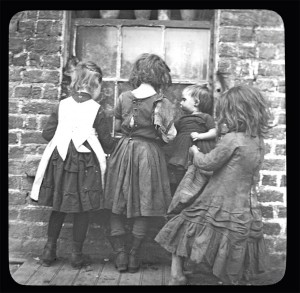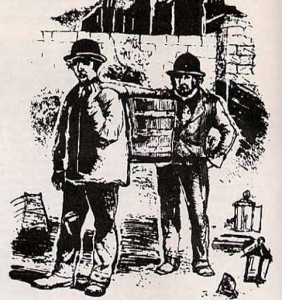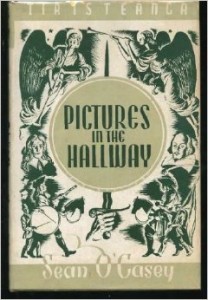“I thought that no man liveth and dieth to himself, so I put behind what I thought and what I did , the panorama of the world I lived in- the things that made me.” Sean O’Casey (1948)
Between 1939 and 1955 Sean O’Casey published six volumes of Autobiography. The first three in particular contain much about his life as a North Dock resident. Throughout this anniversary year, marking 50 years since his death, we intend to present short extracts from these works, concentrating on sections which are most relevant to the area. In this excerpt we find young Sean (Johnny) relaxing and day-dreaming on Hawthorn Terrace (the family lived at number 25). But the peace and quiet is soon interrupted by a visit from the ‘Dung dodgers’ , sending the women folk into a flurry of activity . These events took place in the 1890′s .
“…he hated the smell of beer, and loved the smell of the hawthorn tree. The spice of Ireland, Ireland’s Hawthorn tree. And this grand tree was theirs. Right at the top of the little street it stood for everyone in the street to see. The people of the street were always watching it, except in winter when it was bare and bony, cold and crooked. But the minute it budded, they took their eyes to it, and called it lovely.
Th’ hawthorn tree’s just beginnin’ to bud, someone would say, just beginnin’, and the news would go from one end of the street to the other. Th’ hawthorn’s buddin’ at last. Did yeh hear? No; what? Why, the hawthorn tree’s burstin’ with buds; I seen Mrs. Middleton a minute ago, and she says the hawthorn tree’s thick with half-openin’ leaves, so it is. And the first flower would send them into the centre of a new hope, for the praties were dug, the frost was all over, and the summer was comin’ at last. And no cloud of foreboding came till autumn’s dusky hand hung scarlet berries on the drowsy tree, and all the people, with their voices mingling, murmured, the long dreary nights, the reckless rain, the chilly sleet, the cowld winds, an’ all the hathred in winther is comin’ again.
Johnny turned his thoughts away from the thought of winter, and gazed again at the pearly-blossomed hawthorn tree. Here, some day, in the quietness of a summer evening, in a circle of peace, it would be good to sit here with curly-headed Jennie Clitheroe, nothing between them save the sweet scent from the blossoms above. It would be good, good, better, best, positive, comparative, superlative, an’ God would see that it was good, and would no longer repent that He had made man in His own image.
If he wanted, now, he could easily climb up and break off a branch to bring the scent of the hawthorn tree right into his own home. But all the people round said it was unlucky to bring hawthorn into a house, all except his mother, who said that there was no difference between one tree and another; but, all the same, Johnny felt that his mother wouldn’t like to see him landing with a spray in his hand. It was all nonsense, she’d say, an’ only a lively superstition; but you never can tell, and people catching sight of hawthorn in a house, felt uneasy, and were glad to get away out of it. So it was better to humour them and leave the lovely branches where they were. Leave it there, leave it fair, and leave it lonely. Sacred to the good people, Kelly said; but he was only up a few years from the bog. They, the fairies, danced round it at night, he said, gay an’ old an’ careless, they danced round it the livelong night, and no matter how far away they were, they heard it moan whenever a branch was broken.
From under the shade of the hawthorn tree Johnny looked down the little street, and saw a stir in it. Down at the far end he saw what looked like little hills, one after the other, on each side of the narrow way. Women, opening doors and standing on the thresholds, were gazing about near where the little hills lay. I lift up mine eyes unto the hills.
Suddenly, he heard a call of Johnny Cassidy! Johnnie Cassidy! He turned his gaze to the right, and, a little way down the street, saw Ecret with hands cupped over his mouth to make his voice travel farther, calling Johnnie Cassidy, your mother wants you!
Lower down still, he saw Kelly, with his hands cupped over his mouth, calling out louder than Ecret, Johnny Cassidy, Johnny Cassidy, your mother wants you quick! The dung-dodgers are here!”
“ Johnny hated these dirt-hawks who came at stated times to empty out the petties and ashpits in the backyards of the people, filling the whole place with a stench that wouldn’t disappear for a week. He sighed, and, leaving the shade of the hawthorn tree, hastened as slow as he could down the street to join his mother.
The whole street was full of vexation and annoyance. Women standing at their doors this side of the street were talking to women standing at their doors on the other side of the street, and murmuring against the confusion that had come upon them, upsetting all they had to do till this great fast of the purification had come to an end.
– Always comin’ down on a body at an awkward time, managing to present themselves when the families were in the throes of doin’ important things. If they didn’t come on washin’ day, they came when the clothes were flutterin’ on the lines to dhry; an’, if they didn’t come then, they were knockin’ at the door when the few white an’ delicate coloured things a body had were bein’ spread out to be carefully an’ tenderly ironed.
– It’ud vex th’ heart of a saint, said Mrs. Cassidy, over to Mrs. Middleton, an’ she standin’ on the kerb in front of her hall door, comin’ just when me two boys are home for a little leave. They’ll come thrampin’ in an’ go thrampin’ out, leaving the dirt of petty an’ ashpit ground into the floor of the room an’ the hall, an’ the two boys expectin’ everything to be spick an’ span, an’ a special ever-ready attention to them as a little compensation for the constant right turn an’ quick march of the barrack square.
– It’s a rare hard an’ ever-endin’ fight we have, said Mrs. Middleton from her door on the opposite side of the street, again’ the dust an’ dirt we gather around us in the course of our daily effort to keep things in ordher. Here I am, with the youngsters all ready, bar the puttin’ on of their caps, to take them over to me sisther’s I haven’t seen for months, living on a green patch on the side of the Tenters’ Fields, who’ll be waitin’ for our arrival, an’ sthrainin’ her ear for a knock at the door, the time she’s gettin’ ready a pile o’ pancakes for the gorgin’ of the kidgers she sees so seldom.
– An’ the dark row that’ll shine over the whole place, went on Mrs. Cassidy, heedless of what Mrs. Middleton had told her, if as much as a speck violates the tender crimson of the boys’ tunics, issued undher a governmental decree of a spotless appearance, so that no scoffer may be given a chance to pass a rude remark about the untidiness of the Queen’s proper army.”
 Dublin children from the same era .
Dublin children from the same era .
“ – Now, looka the poor Mulligans, said Mrs. Middleton, meandering across the road to stand on the pavement a few feet from Mrs. Cassidy, watching her trying to pry up the tacks that held the faded oilcloth to the floor, shoving an old knife-blade under the tack heads, and gently forcing them out so as not to make the oilcloth any worse than it was, looka the poor Mulligans, with their four chiselurs down with the measles, two o’ them lyin’ in the room the dung-dodgers’ll have to pass through, with the doctor shakin’ his head over one of them, an’ the mother’s soul-case worn out runnin’ from one to the other, thryin’ to ward off any dangerous thing that may be hoverin’ over their little heads, while the dung-dodgers are busy filthifyin’ the whole place, an’ she only havin’ two hands on her to tend the children an’ clean up the mess when the dung-dodgers are gone, before she dare sit down in the shade of a little less to do.
– Well, we’ll only have to give her a hand when we’re a little free ourselves, said Mrs. Cassidy, an’ save the poor woman from suddenly dhroppin’ outa her standin’.
– An’, went on Mrs. Middleton, looka Mrs. Ecret, aftherpaintin’ her hall door only yestherday, with a tin o’ paint her boy providentially found – when no-one was lookin’, I suppose – an’ varnishin’ it well to finish it off, all afthercomin’ to grief with them tearin’ their baskets of dirt against it, comin’ in an’ goin’ out, refusin’ to wait till the door was decently dhry, an’ leavin’ it lookin’ for all the world like the poor little maiden all forlorn who married the man all tattered an’ torn. Though I’d say sorra mend her, goin’ about like the cock of the south because her hall door was the only one on the sthreet that had had a lick o’ paint on it since Noah first saw the rainbow. But there’s always a downfall in front of them who strive to ape the airs of the quality.
Mrs. Cassidy gazed at the oilcloth she was lifting, and sighed resignedly.
– This is the last time I’ll get this to stand the sthrain, she said. It’s fare you well, me lady, the next time I thry to get it up. You’re perfectly right, she added, turning towards Mrs. Middleton, for it’s a bad thing to allow yourself to crow over worldly possessions, for we brought nothing into the world, an’ it’s certain we can take nothing away.
– Only a good character, murmured Mrs. Middleton, only a good character, an’ God knows it’s hard enough to take that away with us, either. Here’s your Johnny, now, to help you, with a tiny sprig o’hawthorn in his hand. Don’t let him bring it into the house, she said seriously, bending her head close to Mrs. Cassidy, for it’s the same may bring with it the very things we thry to keep at a distance.
– An’ what does it bring into the house with it? asked Johnny.
– Things that toss in a golden glory to a distant eye, said his mother, and, at the touch of a human hand, turn to withering leaves whirling about in a turbulent wind.
– And, said Mrs. Middleton, things that swing in a merry dance to a silver song that changes, quick as thought, to a dolorous sigh and a thing stretched out in a white-wide sheet in the midst of a keen an’ the yellow flame from a single candle. So leave your little twig o’ hawthorn on the window sill outside, alanna.
– Ay, Johnny, said his mother, leave it there, for though it is only roman catholics who cherish such foolish fables, it’s always safer to be on your guard.”
Extract from “Pictures in the Hallway” (1942)
All six volumes of Sean O’Casey Autobiographies, republished by Faber and Faber, are currently available in both print and kindle editions.
If you have a favourite Sean O’Casey extract please bring it to our attention.
Contact us at eastwallforall@gmail.com




